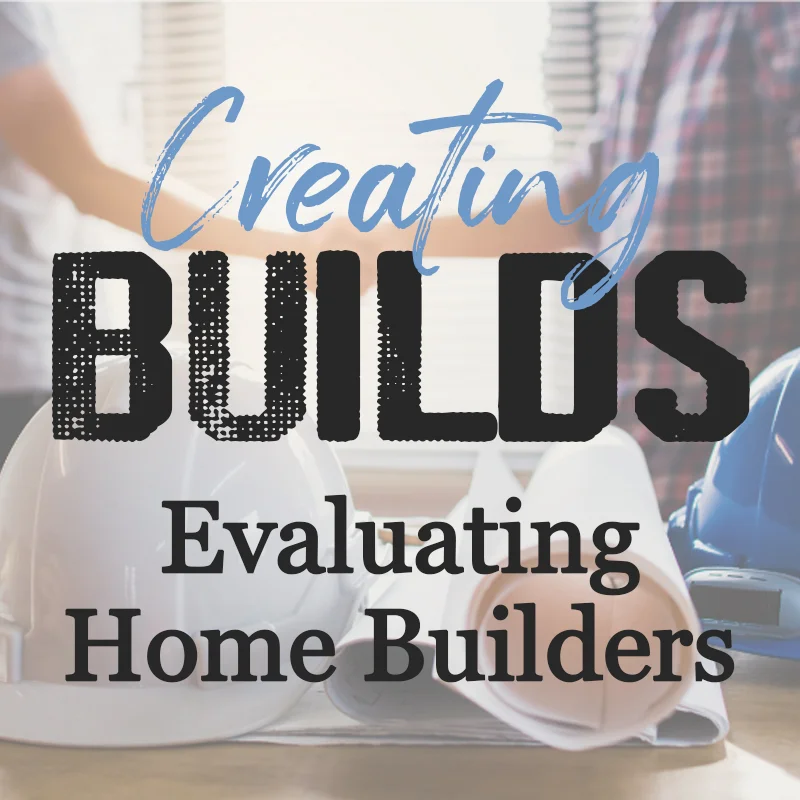
When it comes to building a new home, finding a general contractor (builder) who aligns with your values, is trustworthy, and delivers excellent quality is crucial. Here are some key factors to consider when evaluating potential builders:
1. Research and Reputation
Start by researching different builders in your area. Look for reviews, testimonials, and ratings from previous clients. A reputable builder will have a strong track record of satisfied customers and positive feedback. Interview multiple builders to determine how they operate, what their fee structure looks like, and what level of accountability they will bring to the project (are they assuming full responsibility for the build or are they serving in a limited, supervisory capacity?). Assess their personalities to determine if you can work with them. For example, if you are a very structured type-A personality, it might be best to avoid hiring a laid-back type-B personality that tends to make stuff happen on the fly. Evaluate their preparedness for the initial meeting. Did he/she review information you may have provided prior to the meeting? Did he/she come prepared with a way to take notes? Determine how he/she plans to communicate with you throughout the build process. Is there an app that will help you stay in sync or will you use email/text? How does he/she price services? You need to understand exactly what you will owe your builder when all work is complete. Ask about change orders so you understand how those work should the need arise during your project.
We suggest looking for references and reviews online prior to selecting builders to interview. If you are unable to find references or reviews, ask for them during the initial interview. When contacting references, ask them:
Does the builder produce excellent work?
Was your project completed within the defined budget? If not, what caused the budget overage?
Was your project completed in a timely manner?
How did the builder handle change orders?
Would you hire this builder again?
2. Communication and Transparency
Open and transparent communication is essential for a successful partnership with your builder. During the evaluation process, pay attention to how responsive and informative they are. Are they willing to answer your questions and address any concerns? A builder who values clear communication and keeps you informed every step of the way is more likely to align with your values and provide a trustworthy experience.
3. Site Visits and Inspections
Before making a decision, visit some of the builder’s completed projects and ongoing construction sites. This will give you a firsthand look at the quality of their workmanship and attention to detail. Take note of the materials used, the overall finish, and the level of cleanliness and organization onsite. You may also consider hiring a professional inspector to assess the builder’s work for compliance with building codes and industry standards.
Remember, building a new home is a significant investment, both financially and emotionally. Prior to signing a contract with a builder, be sure to review it thoroughly. Understand your obligations and those of the builder. Contracts can be win-win agreements, though it may take some work to negotiate terms that are agreeable to both parties. Take the time to thoroughly evaluate potential builders to ensure they align with your values, are trustworthy, and deliver excellent quality. By doing so, you can have peace of mind knowing that your dream home is in capable hands.
4. Contract terms and conditions
- Scope of Work: Ensure the agreement clearly defines roles and responsibilities. Know what is expected of you and what the builder’s responsibilities will be in the building process. Denote all materials and finishes for your residential project, including any customization or special requests.
- Payment Terms: Review the total contract price, payment schedule (such as down payment, progress payments, and final payment), and any provisions for changes or additional work.
- Insurance and Liability: Confirm that the contractor has sufficient liability insurance and worker’s compensation coverage. Understand your liability in case of accidents or damages on your property during the project.
- Timeline and Schedule: Evaluate the proposed timeline for the project, including start and completion dates, and ensure it aligns with your expectations and any commitments you have.
- Change Order Procedures: Clarify how change orders will be handled, including approval processes, cost adjustments, and impact on the project timeline.
- Subcontractors and Suppliers: Understand if subcontractors or suppliers will be involved and ensure they meet your standards. Verify their qualifications and ensure they have proper insurance coverage.
- Permits and Regulations: Confirm that the contractor will obtain all necessary permits and adhere to local building codes and regulations throughout the residential construction or renovation process.
- Termination Clause: Understand the conditions under which either party can terminate the agreement and any associated penalties or procedures for termination.
- Warranties and Guarantees: Review any warranties or guarantees provided by the contractor for workmanship and materials used in your residential project. In our part of the country, builders generally offer a one year comprehensive warranty.
- Dispute Resolution: Determine how disputes will be resolved, whether through mediation, arbitration, or litigation, and ensure you’re comfortable with the chosen method.
- Indemnification: Clarify provisions related to indemnification, specifying who is responsible for legal claims or damages arising from the residential project.
- Lien Waivers: Ensure the agreement includes provisions for obtaining lien waivers from subcontractors and suppliers to protect against potential legal claims on your property.
- Performance Bonds: Consider whether the contractor should provide a performance bond to guarantee completion of the residential project according to the agreed terms.
- Communication and Reporting: Establish clear communication channels and reporting requirements to keep you informed of project progress and address any concerns promptly.
- Compliance with Safety Standards: Verify that the contractor will adhere to safety standards to protect workers and your family during the residential construction or renovation process.
***We are not attorneys and do not give legal advice. Please have your attorney review all agreements.***
